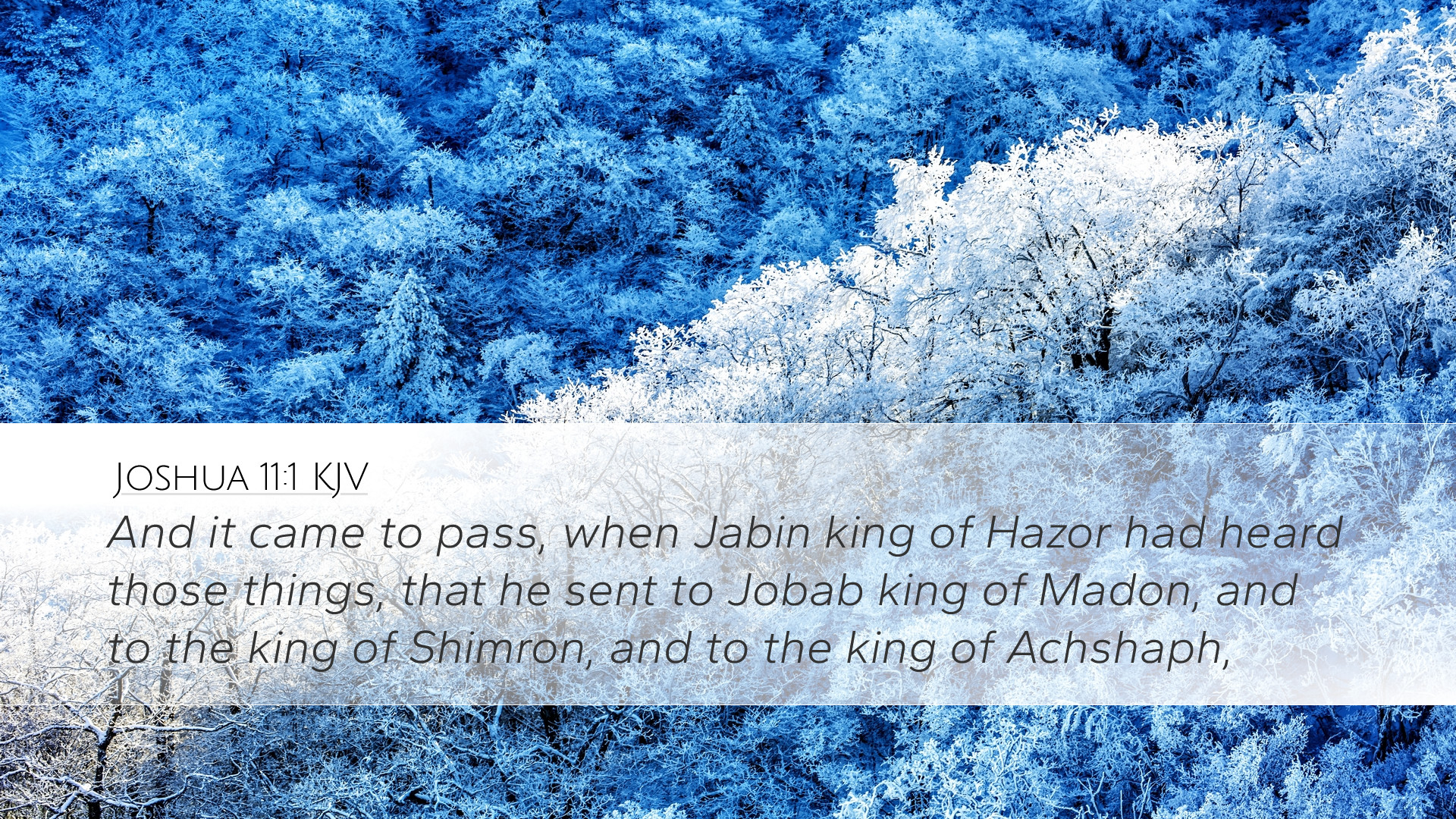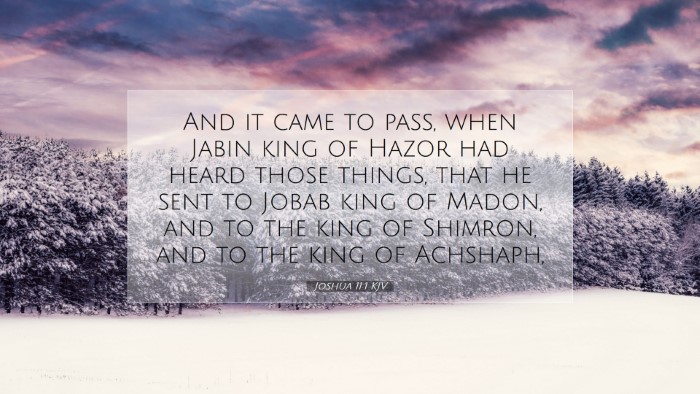Old Testament
Genesis Exodus Leviticus Numbers Deuteronomy Joshua Judges Ruth 1 Samuel 2 Samuel 1 Kings 2 Kings 1 Chronicles 2 Chronicles Ezra Nehemiah Esther Job Psalms Proverbs Ecclesiastes Song of Solomon Isaiah Jeremiah Lamentations Ezekiel Daniel Hosea Joel Amos Obadiah Jonah Micah Nahum Habakkuk Zephaniah Haggai Zechariah MalachiJoshua 11:1
Joshua 11:1 KJV
And it came to pass, when Jabin king of Hazor had heard those things, that he sent to Jobab king of Madon, and to the king of Shimron, and to the king of Achshaph,
Joshua 11:1 Bible Commentary
Commentary on Joshua 11:1
In Joshua 11:1, we find a critical juncture in the narrative of the conquest of Canaan. The verse states, "And it came to pass, when Jabin king of Hazor had heard those things, that he sent to Jobab king of Madon, and to the king of Shimron, and to the king of Achshaph."
Contextual Background
This passage depicts the growing coalition of Canaanite kings who opposed the Israelites. The king of Hazor, Jabin, recognized the threat posed by the Israelite invasion and initiated a strategic alliance to confront this common enemy. This sets the stage for a significant confrontation and highlights the theme of divine intervention in Israel's conquest.
Insights from Matthew Henry
Matthew Henry emphasizes the significance of Jabin's response to the Israelite victories. He notes that, "When men have made great efforts against God, they are often more impressed to unite in their efforts when they see the power of God at work." This illustrates the universal acknowledgment of God’s sovereignty, even among those who oppose His people.
Moreover, Henry points out that Jabin, despite being “king of Hazor,” signifies the alliance of several kings who represent the collective resistance of the Canaanites. By forming this coalition, Jabin seeks to bolster his strength, suggesting both strategic wisdom and human folly as they rise against the divine mandate.
Insights from Albert Barnes
Albert Barnes further elucidates the geographical and historical significance of the cities mentioned. He suggests that "Hazor was the chief city of the northern Canaanite kingdom," and by summoning allied kings from Madon, Shimron, and Achshaph, Jabin was attempting to consolidate power.
Barnes also comments on the implications of such alliances, asserting that "the gathering of these kings signifies the desperate attempts to thwart the progress of God’s plan." This collective response underlines the reality that opposition to God's purposes is both a spiritual and political undertaking, one that parallels the struggles found throughout biblical history.
Insights from Adam Clarke
Adam Clarke provides a detailed analysis of Jabin's actions, focusing on military strategy. He remarks that "Jabin's confederation signifies a realization of the dire circumstances his kingdom faces in the wake of Israel’s conquest." This illustrates the rationale behind forming alliances, as conquered nations often rally together in a bid for survival against a greater threat.
Clarke notes that this coalition is not only a practical response but also reveals a profound theological truth: "Man’s efforts to resist God ultimately lead to their own downfall." The greater the threat, the more unified these kings become, yet they fail to recognize the futility of their struggle against divine will.
Theological Implications
The gathering of Jabin and his allies reflects a deeper spiritual battle where earthly rulers strive against divine decree. This passage serves as a reminder of the futility of resistance against God’s plans. The growing alliance represents both unity in opposition and the frailty of human schemes when faced with divine omnipotence.
The proactive measures taken by Jabin underscore a critical principle within scripture: while human beings often unite for protection in the face of danger, it is ultimately God's authority that prevails. The narrative invites believers today to trust in the sovereignty of God, especially when confronted with overwhelming odds.
Practical Application for Believers
For pastors, students, theologians, and scholars, this passage serves not only as a historical account but also as practical wisdom. It challenges believers to be vigilant against the alliances and strategies that oppose God’s truth. The actions of Jabin reflect the relational dynamics of power, fear, and faith.
- Beware of Alliances: Just as Jabin sought allies against God’s people, Christians must be discerning in their relationships and alliances, ensuring they align with God's purposes.
- Trust in Divine Authority: The narrative encourages believers to recognize that human efforts in opposition to God are ultimately in vain. Faith in God’s sovereignty brings peace amid chaos.
- Engage in Spiritual Warfare: Understanding that the battle is spiritual and transcends the physical realm is crucial for today’s disciples. Prayer and reliance on God's word are vital.
Conclusion
Joshua 11:1 serves as a powerful reminder of the interplay between faith and opposition—a theme that runs deep within the biblical narrative. The collective response of the Canaanite kings under Jabin's leadership is a testament to both the strength of human unity against divine purpose and the assured triumph of God's plans. Amidst the trials of life and ministry, the assurance that God stands sovereign encourages believers to stand firm in faith, equipped with the knowledge that He will ultimately prevail.


